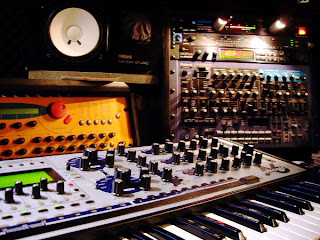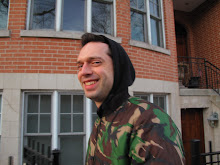K: Yes, to friends. The mix tape process was the major part of success. I bought a telex machine off this guy, which were a grand at the time, I got it for $300. It basically copied 3 tapes a min a side. So we bought different colored metallic tapes with printing on it, that had blank media on it. Juan and I would sit up all night long, copy thousands of tapes. We had a system. There was a local record store. We would sell ten tapes at the local store, sell those for 10 bucks, which would give us 100 bucks. That money allowed us to buy 50 more tapes. We would sell 10 and give away 40. As things got more popular, we would sell 20, give away 80. Once we started getting emails back from people 5 states away that got our tapes, we were like "Wow", it blew us away. We gave away tapes in a tiny little area and somehow they migrated.
G: How did you land your residency at Trax in 96?
K: I had a friend, this was before ECB, who saw me play in Richmond and decided to book me at Trax, probably DC's most legendary club. It had two indoor rooms, main room and a smaller room, and an outside area with a volleyball court, and the system was ridiculous. I got booked to play the outside room.
At the time, you had all these hiphop/midtempo/downtempo djs that were doing tricks, I was mimicking these people with house records. With records you don’t have effects, they didn’t exist back then. If you wanted to create an echo, you had take two records and slide one record off half beat. And then you could slide the record a quarter beat or you could set it off a little bit and you could have a flange. So I started doing these tricks with old house records because that’s all I had. The owner came out, who was an old house head, he came up to me personally and asked me if I could come back next week and play the small room for 75 bucks, that was the first time I got paid. 75 dollars back then was huge for me. So I went back. The room had maybe like a 100 people and it wasn’t even fully packed. He asked if I could come back next week. Next week there was 400 people. He asked me to come back again for a 150 bucks. The owner of Trax was one of those guys who knew how to run a club and he knew how to make everybody happy.
During the my Trax residency, was holloween, this is how East Coast Boogiemen started. I played this local party in Richmond Virginia with Juan. We were really competitive with each other, we both played the same type of music. There was a lot of jeaulousy involved. One would get more gigs or because people liked the other one better. We were young and stupid. We had this dj battle. It drew a lot of people, the crazy thing is the battle would push us to the limits. So we would do stuff that we would never try live, which made for an awesome show.
There was this guy from Pittsburgh, who asked us to play a party in Pittsburgh, which was our first out of state gig. We played together but we weren’t battling. The other thing about spinnin with somebody is that you can turn over records really quickly. We were playing on 4 turntables, not switching off. On our drive home and all that animosity disappeared. We were now on the same team and it was a good thing.
We got booked at a Halloween party. There was this guy dressed up as the boogieman, he had a stocking mask with a shirt that said boogieman on it. He had this thing that he was swinging around. He actually hit me with it in the face and knocked me on the floor to the point were my eye was bruised. After, there was this joke going around that I got knocked out by the boogieman. We were like "Wow there’s something there". During that time there was the whole east coast vs. west coast hip hop battle. Jokingly we thought, "maybe we can be called the East Coast Boogiemen". Juan is an illustrator, that’s what he went to college for, everything was a comic book to him. We thought about creating a comic book called east coast boogiemen, we would battle djs on the west coast, that was our imagination. None of this was supposed to be taken seriously.
We got back into town and this promoter called Carter, heard the whole story, booked us for his Halloween party. To mess with us, he put on the flier, "East Coast Boogiemen, Ken and Juan." Now the joke was growing. All our friends were "you guys are the east coast boogiemen". We wanted to kill Carter. That’s not really what we want to be called. But it spread so quickly, we just gave up trying to justify why we’re not East Coast Boogiemen and just went with it.
I went up to the owner of Trax and I told him I had this new partner, and asked if Juan could play with me. He agreed. We were playing the small room and the large room moved into the small room. So the owner put us in the main room and gave us 400 dollars. We thought, "wow so much money to buy records." At that point we started traveling to new york, we would drive six hours north, we would spend a whole 24 hours in NYC, buy all of our records, come home, and no one had our music.
We played the big room at Trax and the whole place was packed. The second time we played in the big room the club let the main guy go and gave us the residency. Our local rave club, which was called Buzz, got 2 to 3 thousand people every weekend and was competing with us. Then buzz got shut down. That whole crowd moved to Trax. So we had 3 to 4 thousand people every weenkend. It was the peak for us, it was like heaven.
At one point, we were driving from Richmond, going to New York, we thought, "lets drive to Chicago and get records from there." We would go to Pittsburgh, buy records from this girl who owned a store called Milk, she was importing all these records from Chicago. We were diggers, we dug for music, not just for house, we would dig for disco, jazz, we were record collectors.
There was this one promoter that threw the biggest parties on the east coast, Lonnie Fisher, called UltraWorld, he did it at the DC armory, he’d have 15 to 20 thousand people there. Lonnie was starting a new festival, Starscape, and he heard us play somehow. We assume he found out about us from Trax. We always wanted to play, but we never asked people, we were hoping the music would speak for itself. He called my house, I lived with my sister at the time, and she said that some guy Lonnie was on the phone. Excited and nervous, I got on the phone, "Hi I’m Lonnie, I really like what you guys play, old school house, would you guys play at the festival?" I was like of course and his second question was how much. That threw me off guard because at the time I had no business sense at all. So I told him 300 and he said "sold." I went to Juan and told him the great news. We’re playing Starscape. He was thrilled and he asked how much we were getting paid. I told him 300. He screamed "you idiot, I’m going to kill you". People were getting paid $2 thousand up to $3 thousand to play these events. Ironically people were making more money then. I didn’t care, I would’ve played for free. And we played Starscape, in front of 2 thousand people.

We wanted to take it up a notch, so we decided to bring a sampler, I sampled my voice. saying phrases like "Richmond" and "back to the old school". So here we are , sitting on stage, with 4 decks, and when we hit those samples, all our Richmond posse would go crazy. I remember on our way up there we wondered what to play. Our thing was we to never practiced, lets create on the spur of the moment, the riskier it got, the better the show would get, even when we would try things that might ruin a set. It was that rush of energy, risking everything, to do something, and if it happened and it worked, we would look at each other and be like "Oh my god!" It would blow our minds, like scratching or juggling records between each other. So on the way up there Juan said "no man, we can’t practice", from that night on I never practice anything. Sometimes you find mixes by accident, and you remember those accidents, and you take those and pair them with other accidents, keep that going all year long, with new music, and that’s how I’ve always done it. Like when a vocal on one record speaks to another vocal, that’s why its fun.
DJ Shadow and Qbert told to us, "Really good djs will fuck up, they will take that mess up and destroy it with the mess up. Mimic the mess up over and over so its a rythmatic mess up, and it becomes a part of the music. Were people are like "woe, oh that makes sense". If you train-wreck, just wreck in syncopation for a measure, and it becomes a part of the song. Take that mess up and redo it, and use it to add fire to your music, that’s how you take it to the next level, the turntablist level. That’s the way we thought about it back then.
We played Starscape festival, and the crowd went crazy. After that one set, I had 8 gigs on my answering machine in other states. Within a few months of that, we were playing Alaska from Virginia, that’s how far it went without ever releasing a record. Within one year we were playing Electric Daisy Carnival. Within two years, we were in front of 50,000 people. It happened so fast.
At that point I started making music, we neeeded to take it up a notch. So I went out and bought an MPC, because I met this guy Halo, who had one, he lived in Chicago. My first record, got signed to Astralwerks. This is one thing I tell producers today...
That's it for now, peace,
Greg K





















